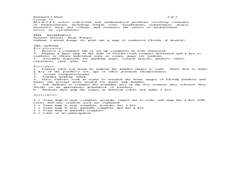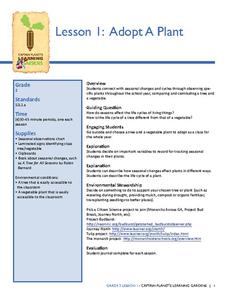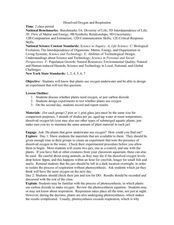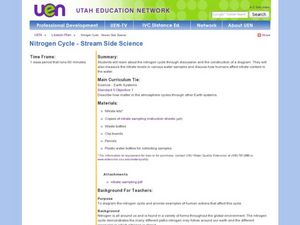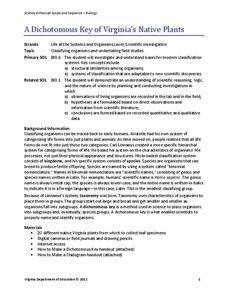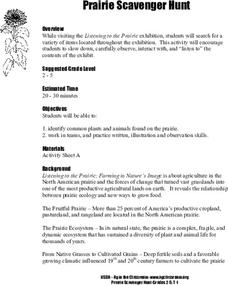Curated OER
Listening to the Prairie
Students, in groups, visit an exhibit and for a prairie scavenger hunt to locate sunflowers and name products made from them. After sketching a prairie dog, they find nature cues farmers use when growing plants and raising animals. The...
Curated OER
The Portable Niche
Third graders, in groups, research animals, plants, and conditions found in ecosystems.
Curated OER
Thinning and Transplanting
Middle schoolers identify and observe one plant per section in their quad and to transplant the surplus seedlings to empty quads and interpret why this is important. They then discuss the purpose of thinning and transplanting. Finally,...
Curated OER
Home on the Range
Students use maps and mathematics to determine the appropriate panther population in a given area. In this Florida ecology lesson, students research the area requirements of male and female panther and use a map to help calculate how...
Curated OER
Sustainable Livestock
Young scholars investigate healthy eating habits by researching livestock. In this food sustainability lesson, students research the negative impact factory farming has on our environment due to pollution. Young scholars define...
Curated OER
Pesticide Watch Card
Young scholars examine human health by identifying dangerous pesticides. In this agriculture lesson, students research the food production system in the United States and discuss dangers such as pesticides, chemicals and insecticides...
Captain Planet Foundation
Adopt-A-Plant
Note the way that plants change during the season by adopting a plant on your school campus. After your class chooses their plant, they research the plant's needs, how it differs from other plants, find ways to support their plant's...
Curated OER
Fantastic Flower
Here is a clever lesson plan on pollination of flowers for you. In it, learners study the anatomy of a flower, and play a game in which they simulate the process of pollination. This fine plan brings in elements of art, physical...
Curated OER
Renewable vs. Non-Renewable Resources
Fifth graders are introduced to the important topic of renewable, and non-renewable, resources. They are expected to be able to correctly categorize different types of resources as renewable or non-renewable. Another emphasis of this...
Curated OER
Dissolved Oxygen and Respiration
Students are presented with the question, "Do plants that grow underwater use oxygen?" They create an experiment to test the presence of dissolved oxygen in the water using provided materials. Student experiments include a control jar as...
Curated OER
Tides in the Hudson
Students view an illustration of the Hudson River watershed and identify the bodies of water shown. They discuss what happens when fresh and salt water mix. Students view a teacher demonstration of the stratification of fresh and salt...
Curated OER
Change Since 1609
Students recognize how the climate of the Hudson Valley has changed since the last glaciation. They explain these changes using a reconstruction of the land use changes in the Hudson Valley composed of confetti, Ziploc bags and other...
Curated OER
Paleoclimate of the Hudson Valley
Students recognize how the climate of the Hudson Valley has changed since the last glaciation and be able to explain these changes. They reconstruct the paleoclimate of the Hudson Valley.
Curated OER
Nitrogen Cycle-Stream Side Science
A thorough background and nitrate sampling lab sheet are provided to share with your young scientists. After discussing the nitrogen cycle with the class, you will break them into small groups and show them how to use their inquiry...
SF Environment
Pre-School Composting and Recycling!
You can never be too young to get involved in composting or recycling. Here is a lesson plan that has been made for the very littlest learners and it's all about the importance of conservation. They'll sort compostable and recyclable...
Curated OER
Comprehension: Compare and Contrast Topics in Two Texts
A scripted lesson can be a big help for new teachers. This fully scripted three-day learning activity provides teachers with the means to demonstrate how to compare and contrast two topics in two texts. Learners will work as a class to...
Virginia Department of Education
A Dichotomous Key of Virginia’s Native Plants
Can your class correctly classify plant species? Individuals explore native plants of the local environment and correctly classify them into their respective categories. They investigate differences in the plants and discuss similarities...
University of Southern California
Mastering Microbes
Small but mighty! Learners explore the role of microbes in a healthy ecosystem. An engaging lesson asks pupils to design an aquaponics system that demonstrates that healthy microbes are necessary to maintain the ecosystem.
Curated OER
7th Science Quiz
This seventh grade life science quiz has a professional appearance and well-written multiple-choice questions. However, it seems to cover too broad a variety of biology topics for only 15 questions to fully assess. There is one question...
Curated OER
We've Come a Long Way, Baby!
Students study technology and the different reproductive technologies available today. In this human reproductive technology activity students describe how engineers create technologies to improve the health of mothers and babies.
Curated OER
De"compost"ition
Learners develop an understanding of the decomposition process and the parameters which influence the rate at which it occurs.
Curated OER
Prairie Scavenger Hunt
Students search for a variety of items while visiting a Listening to the Prarie exhibition.
Curated OER
Renewable vs. Non-Renewable Resources
Here's a fine lesson on renewable and non-renewable sources of energy for your 5th graders. In it, learners list a number of natural resources on the board, then try to sort the resources into appropriate categories. This helps them to...
Curated OER
Composting
Using 2-liter bottles, junior ecologists create composting tubes in which they place nitrogen-rich and carbon-rich materials. They observe what changes occur over two weeks' time. Provide more specific direction to your class as to what...





